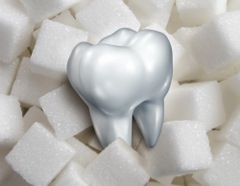 Some people may not associate their smile with a healthy life, but the mouth is the gateway to the body and having a healthy mouth is the start to having a healthy body.
Some people may not associate their smile with a healthy life, but the mouth is the gateway to the body and having a healthy mouth is the start to having a healthy body.
While diabetes can have serious effects on your body, it may also take its toll on your teeth. It’s practically common knowledge now that diabetes affects your body’s ability to process the sugars in foods we eat. But what does that have to do with your teeth?
For starters, even mild diabetic individuals produce far less saliva than non-diabetics, due to medications taken to manage diabetes. But why does that matter? To begin, not only does less saliva affect how food tastes, but it is also a critical component in protecting your teeth from cavities and forming plaque. In short, as a diabetic, you are more likely to get cavities, experience plaque buildup, and have an increased risk of dental infection.
This means that diabetics should brush their teeth at least twice a day (electric toothbrushes are the best at removing plaque) for two minutes with fluoride toothpaste, and floss at least once a day. These steps, along with regular cleanings with your hygienist or dentist, are essential to removing plaque.
If plaque and bacteria aren’t completely removed from your teeth daily, you’ll produce calculus (and not the hard math class, but much worse). Calculus is hardened plaque that cannot be removed by flossing and brushing, but requires your dentist or hygienist to remove it. If the calculus is not removed, gums will swell and more easily bleed. The consequences of swollen gums that bleed more easily is the development of the mouth disease periodontitis.
Periodontitis destroys the bone that supports your teeth. In time, the bones that keep teeth in place will recede around your teeth and, left untreated, will result in teeth that loosen and ultimately fall out. The most nefarious part of gum disease is that, because it’s not painful, it can go unnoticed without regular checkups and it only presents with pain once it’s too late and your teeth are too loose to be salvaged, which results in them having to be and removed.
The best way to know if you are developing or already have periodontitis is to visit your dentist at least twice a year. There are additional things that diabetics can do to prevent tooth loss: monitor and managing your blood sugar, maintain a healthy diet, limit alcohol consumption and stop smoking. For good dental — and overall — health, keep healthy food chooses in mind; drink plenty of water; eat whole, grains, fruits, vegetables, lean proteins, low fat and fat free dairy foods.
And brush, floss and use a rinsing agent! These steps, combined with proper diabetes management and regular dental visits, will go a long way in maintaining a healthy and beautiful smile.